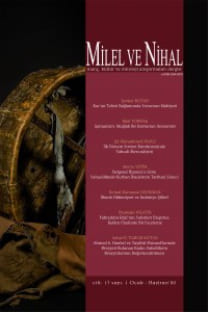Mitolojiden Arındırma Yöntemini Yeniden Düşünmek
Bultmann’ın mitolojiden arındırma yöntemi, Kitabı Mukaddes hermenötiği ile ilgili tarihsel tenkitçi metot olarak bilinir. Ona göre, biz, Yeni Ahit’in asli anlamını, onu ifade edilen konuyla varoluşsal karşılaşma boyutunda okuduğumuz sürece anlayabiliriz. Böylesi bir varoluşsal karşılaşma ise, yalnızca yorumcunun kendi yaşam bağıntısı tarafından yükseltilen bir soru-cevap diyalektiğinde yer alabilir. Burada, varoluşsal karşılaşma evrensel bir kişilik/benlik kavramını öngördüğünden dolayı, soru-cevap diyalektiği kişinin öznelliği noktasında anlaşılır. Bultmann’ın yorum teorisinden farklı olarak, Gadamer’in diyalektik hermenötiğinin linguistik ve tarihsel anlama sınırlarını kaale almasından dolayı, o, soru-cevap mantığını ufukların kaynaşması olarak görmüştür. Bize göre, Bultmann’ın saf varoluşçuluğunu Gadamerci oyun-teorisi ışığında eleştirebilirsek mitostan arındırma kavramını Bultmann’ın epistemolojik metodik aşırılığından kurtaracak ve Bultmann’ın yaptığından daha ontolojik ve diyalojik tarzda anlamaya çalışacağız. Bu açıdan, mitolojiden arındırma yalnızca tarihsel metinler üzerine metodik bir yansıma değil, daha ziyade kendi teknolojik dünyamız ve kendimiz üzerine uygulanması gereken etki tarihinin varlık modudur.
Anahtar Kelimeler:
Mitos, ufukların kaynaşması, oyun, soru-cevap diyalektiği, mitolojiden arındırma
Rethinking the Method of Demythologization
Bultmann’s method of the demythologizing is known as the historical-critical method relating to Biblical hermeneutics. For him, we can understand the New Testament’s original meaning as soon as we read it in the existential encounter with the subject expressed by it. Such an existential encounter can only take place in the dialectic of the question and answer raised by the interpreter’s own life-relation. Here, since the existential encounter presupposes concept of a universal Selfhood, the dialectic of question and answer is understood in point of person’s subjectivity. Unlike Bultmann’s interpretation-theory, since Gadamer’s dialectical hermeneutics took into account the linguistical and historical limits of the understanding, he regarded the logic of the question and answer as the fusion of the horizons. To us, if we can criticize Bultmann’s naive existentialism in the light of Gadamerian play-theory, we’ll release the concept of the demythologizing from Bultmann’s epistemological-methodical excessiveness, and make to understand it more onthologically and dialogically than Bultmann did. In this respect, the demythologizing isn’t only a methodical reflection on the historical texts, but rather is the existence mode of the history of effect which should be applicated to our own technological world and ourselves.
Keywords:
Myth, the fusion of the horizons, play, the dialectic of question and answer, demythologization,
- ISSN: 1304-5482
- Yayın Aralığı: Yılda 2 Sayı
- Başlangıç: 2003
- Yayıncı: Milel ve Nihal: Eğitim, Kültür ve Düşünce Platformu Derneği
Sayıdaki Diğer Makaleler
Mitolojiden Arındırma Yöntemini Yeniden Düşünmek
Mormonluk:Amerika’nın Ahir Zamanının Dini ve Azizleri
Ortak Atamız İbrahim’in Aydınlığında…
Kadim İran’da Din M. M. ŞEMSEDDİN
Geçmişe Ayna Tutarken Kendi Zamanına Tanıklık Etmek ya da Tarihsellik
God is Dead: Secularization in the West
